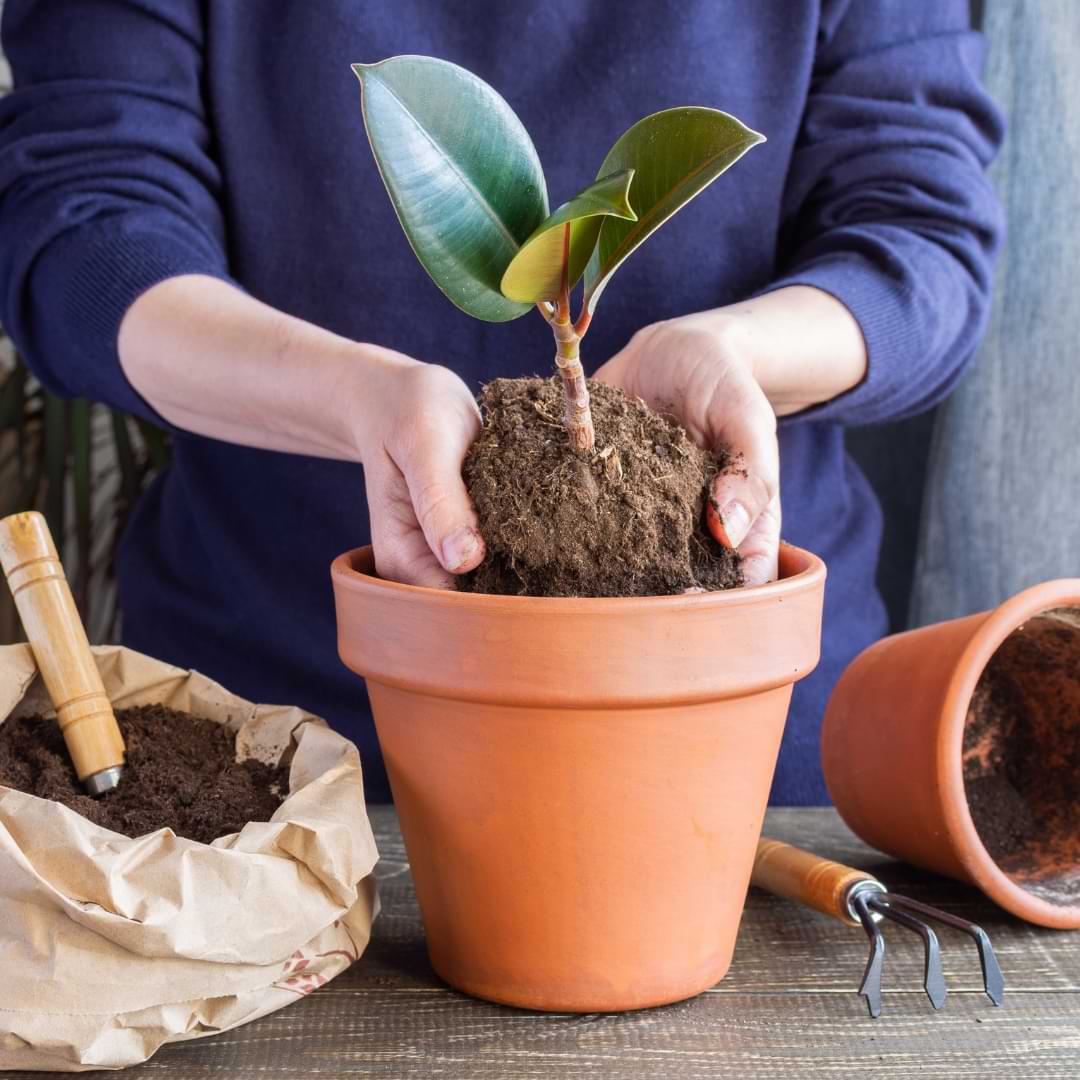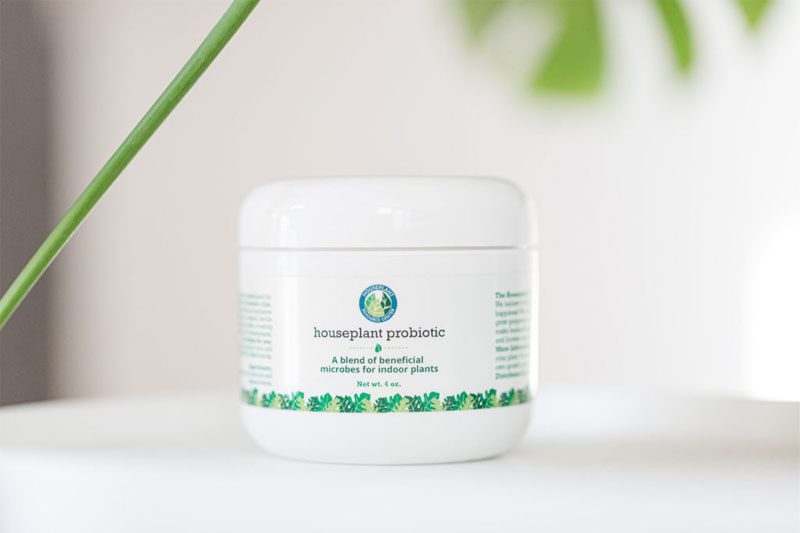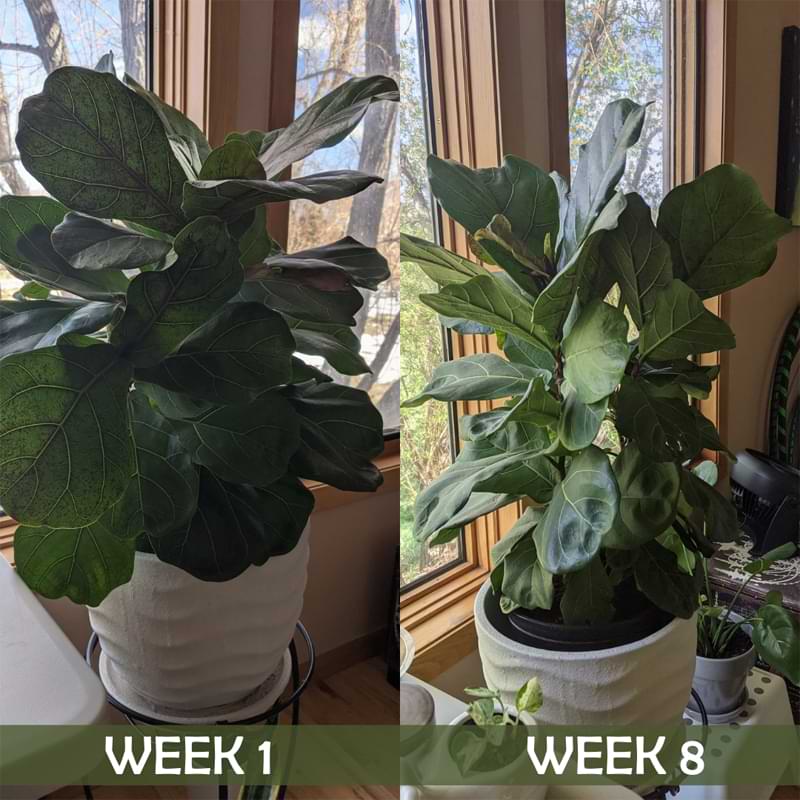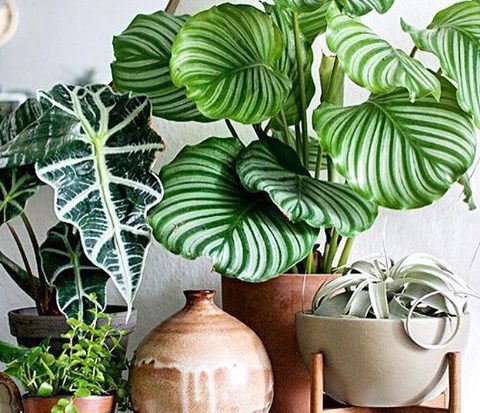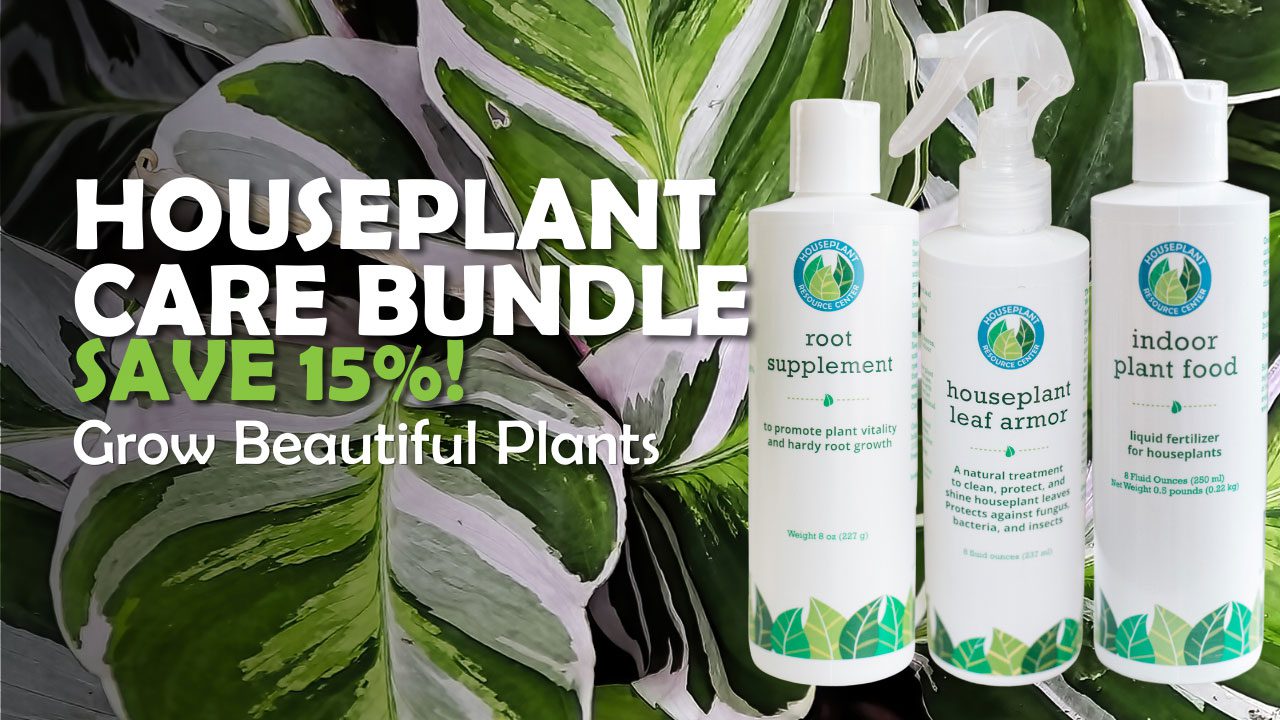Probiotics for plants are a hot topic in the houseplant world lately. You might be wondering what all the fuss is about. After all, what are probiotics, and why do plants need them? Is it enough to simply fertilize your plants regularly, or should you incorporate a probiotic supplement into your houseplant care routine as well?
In this article, we’ll walk you through everything you need to know about probiotics for plants so you can decide whether to use them in your plant care regimen.
Table of Contents
What Are Probiotics for Plants?
First things first: what are probiotics, anyway?
Probiotics are beneficial microorganisms such as bacteria, fungi, and protozoa.
You’ve probably heard of using probiotics for human health, and that we should be eating cultured products like yogurt, kefir, sauerkraut, etc., or taking probiotic supplements. These probiotics are meant to improve our gut microbiome, which benefits our digestion, immune system, and other areas of our health.
Plants have a microbiome too! And a flourishing population of helpful probiotics in the soil can help plants absorb nutrients in the soil, improve their immune system, help them recover from disease and pest infestations, regulate water uptake, and otherwise improve just about every physical process a plant must carry out.
Probiotics can also help your plants grow bigger and healthier leaves and flowers, a stronger root system, and sturdy stems. Not only can these microorganisms make your plants healthy, but they can also make them more beautiful!
Are Probiotics Fertilizers or Soil Conditioners?
Most probiotic supplements for plants fall into the category of soil conditioner because, rather than adding more nutrients to the soil as fertilizers do, they work by increasing soil fertility so your plants can absorb and utilize existing nutrients.
However, some fertilizers that utilize primarily natural materials may also contain probiotics as a convenient side effect of their ingredients. This is often the case in fertilizers that contain cultured compost or worm castings. In nature, nutrients and probiotics occur in the soil together, so using natural fertilizers can help you skip a step!
What Ingredients Are in Plant Probiotics?
The ingredients in plant probiotic supplements can vary widely, but all of them will include some helpful fungi and bacterial strains. Manufacturers of these products will either add these ingredients directly or utilize ingredients that already contain the right microbes.
You’ll also find lots of recipes out there for DIY plant probiotic products that include ingredients like cultured molasses, worm castings, kelp, etc. Compost can also be a great source of probiotics because the organic material has been broken down by naturally occurring microbes that were present in the different components of that material.
How Do Probiotics Improve Soil Fertility?
Probiotics are known to improve soil fertility, which can be very helpful in large and small-scale food agriculture because they may increase yield with fewer synthetic fertilizers. This has great implications for sustainable farming and the environment as a whole!
Probiotics increase soil fertility in a lot of ways, but mostly by breaking down organic material in the soil into simpler forms that your houseplants’ roots can absorb more easily. This improves the general bioavailability of nutrients in the soil, so any plants growing in it can use those nutrients.
Some of these probiotics can also take up residence in your plants’ roots and other tissues, which benefits the plants in many ways, beyond nutrient uptake.
Beneficial Bacteria and Microbes
Beneficial organisms included under the umbrella term of “probiotics” include bacteria and microbes that have symbiotic relationships with various sections of the plant, like the roots and circulatory system. These helpful organisms can include rhizobia, diazotrophic bacteria, mycorrhizal fungi, actinomycetes, etc. Your houseplants provide the perfect living conditions for these organisms, and in turn, those microbes help your plant in a variety of ways.
When you include probiotic supplements in your regular houseplant care regimen, you might notice that your plants grow faster and look healthier with less fertilizer because they’re able to absorb the soil nutrients more efficiently and generally function better overall.
Certain types of microbes can also help your plants grow faster simply by aiding in physical functions such as the transport of nutrients, sugar, and water, and also boosting immunity to harmful pathogens and other environmental threats.
Another helpful benefit of probiotics is that these microbes evolve very rapidly—much faster than your plants! This allows them to adapt to and overcome threats more quickly than your houseplants ever could, which protects your plants from environmental threats as they emerge over time.
Different microbes can also have varying functions in the plant. Nearly all DIY and commercial supplements contain several different beneficial bacterial strains. Many of these bacteria produce hormones that can stimulate plant growth. Some types of microbes even enter the root tissue while others find their way into other parts of your plant and assist in processes that occur in that area of the plant.
There are many, many kinds of probiotics that help your plants in different ways. That’s why ensuring your soil has plenty of beneficial microbes is so helpful for your plant. This is an important part of maintaining soil that’s as healthy and fertile as what you’d find in a plant’s natural environment!
Probiotics for Plants: What Result to Expect
What kind of results can you expect when you start using probiotics on your plants? Here are just a few.
Healthier Growth
Certain probiotics help your plants absorb the proper nutrients and water necessary for leaf growth as well as transport nutrients, water, and sugars around the plant. These microbes can also increase chlorophyll production, which gives your plant’s leaves a beautiful green color. This, in turn, helps your plant convert sunlight into energy, which benefits the whole plant.
Faster Growth
With a helpful army of probiotics working for you, your plants will have easy access to all the nutrients they need to quickly grow taller and produce more leaves and flowers.
Improved chlorophyll production and photosynthesis will also give your plant an energy boost that can lead to a growth spurt.
Finally, these organisms can also stimulate your plant’s endocrine system and produce growth hormones of their own that can help your plants grow.
Improved Flowering
Producing flowers and fruit requires a lot of nutrients, water, and plenty of light, as well as the ability to convert that sunlight into energy.
In flowering and fruiting plants, probiotics have been shown to increase yield, which is great news for agriculture and food production. It can also mean good things for your indoor plants if you’re going for fruit or flowers!
Many fruiting plants don’t typically flower indoors (though some do), but adding probiotics to the soil can help your outdoor plants flower and even produce fruit if that’s what you’re going for (if all other conditions are ideal, of course).
When to Use Plant Probiotics
The short answer here is…it depends. It’s most important to read the instructions on whatever recipe or product you use and act accordingly.
Unlike fertilizer, healthy probiotics won’t cause chemical burns to your plants’ roots if you apply them during the dormant season.
(However, a fertilizer that contains probiotics might be a different story. Be sure to read the label to dilute the fertilizer correctly to prevent overfertilization!)
While probiotics can be used at any time, it makes the most sense to apply regularly during the growing season, which will be spring and summer for most indoor plants. This is when your plants will have a greater need for the benefits the microbes provide.
Houseplant probiotics typically come in spray form or as liquid additives to use when you water.
During the growing season, spray your plants a few times per month or use a diluted probiotic when you water.
You can also find probiotics that come as granules that you mix into the top layer of soil once or twice a month. It’s best to read the label of your product or the instructions. This might be the easiest approach of all because you only have to apply once per month!
The frequency of use for DIY probiotics will vary. Most recipes will provide recommendations for how often you should apply them to the soil or leaves.
Usually, fertilizer-probiotic combos can stand on their own and won’t need to be applied as frequently. Supplements that contain only probiotics but not vitamins or minerals will need to be used along with a separate fertilizer supplement, and application schedules may vary.
As always when using a new product or technique to care for your plants, watch your plant closely for any signs of adverse effects. If your plant reacts poorly, flush the soil or even repot if necessary, making sure to rinse the roots to remove as much of the harmful substance as possible.
How to Use Probiotics for Plants
Probiotics can provide a lot of benefits when used alone, but they work best when used in conjunction with a high-quality fertilizer. This could mean using two separate products or simply using a product or DIY recipe that contains both.
Most probiotics will need to be mixed into the soil, but some are also foliar sprays that you apply directly to the leaves. Read the label on your product or the instructions on your DIY recipe to ensure you’re applying the probiotic properly.
What Are the Best Probiotics for Plants and Soil?
Different supplements and recipes will contain different types of probiotics. And there are so many beneficial bacterial strains, fungi, etc., out there that help your houseplants in different ways that it’s impossible to include them all in a single supplement. It’s difficult to choose the best product or recipe!
That being said, we love our Houseplant Probiotic because it’s super easy to use and contains a multitude of helpful bacteria, fungi, and protozoa to improve the fertility of your plants’ soil.
We’ve seen excellent results from this blend, and so have our customers!
To apply, just mix a couple of tablespoons into the top layer of your plant’s soil every month, and watch it grow.
The Houseplant Probiotic contains beneficial microbes born from our own special process of breaking down dairy manure and straw for an effective, all-natural probiotic supplement as opposed to a synthetic fertilizer or supplement. This also contains plenty of helpful nutrients and can be used in addition to Indoor Plant Food for healthier, more beautiful houseplants.
Get Houseplant Probiotic on Amazon!
Consider Probiotics for Your Plant!
Probiotics are an easy-to-overlook element of indoor plant care. But including even an occasional probiotic supplement in your care regimen can make all your hard work to water, feed, and light your plant properly pay off!
Probiotics are naturally present in a plant’s natural habitat, and we all know that the trick to helping any potted plant thrive is to recreate its preferred environment as closely as possible.
Try adding a simple probiotic supplement to your soil to grow taller, healthier, more robust plants!
Have more questions about your soil and other houseplant issues? For additional help and support, join our online community and more!
The Last Houseplant Book You Will Ever Need

